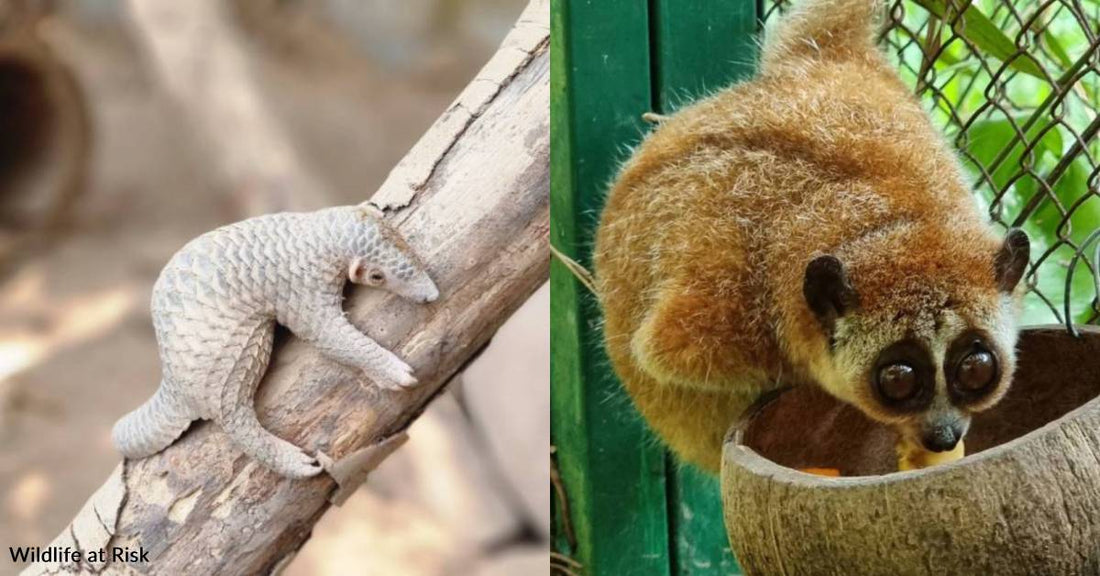7th Annual Holiday Toy & Book Event Help make the holidays brighter this year!
As the Planet Deals with Increasing Biodiversity Loss, You Can Help Us Save Endangered Species
Michelle Milliken
Shifting land use, overexploitation, pollution, and climate change are all coming together to change the planet as we know it. While humans work to adapt, wildlife may be unable to do so. With an estimated one million species at risk of extinction, protecting habitat - and looking after the welfare of animals impacted by human activity - could mean the difference between survival and extinction. You’ve long helped us care for endangered species, and we could use your help again this Earth Month.
A recent report from the Convention on the Conservation of Migratory Species of Wild Animals (CMS), a UN biodiversity treaty launched in 1979, shows that migratory species are especially at risk. Of the nearly 1,200 species listed under CMS, chosen because treaty parties have agreed they’re in need of international protections, 44% are experiencing population declines. A staggering 22% are threatened with extinction, including 97% of fish species. While that impacts the fish species themselves, it may also have deadly consequences for the species that rely on them for food.
 PHOTO TAKEN DURING GREATER GOOD CHARITIES BIOLOGICAL SURVEY TRIP IN VIETNAM
PHOTO TAKEN DURING GREATER GOOD CHARITIES BIOLOGICAL SURVEY TRIP IN VIETNAMFish are increasingly threatened with overexploitation, which was found to be impacting 70% of CMS-listed species. Overexploitation includes overfishing, overhunting, and even accidental capture, which is common in our oceans. One way to counteract this, the report notes, is to strengthen efforts to minimize illegal and unsustainable taking of migratory species, even when it’s not on purpose.
Habitat loss stemming from human activity was another key issue highlighted by the report. Whether it’s agriculture, dam building, or energy and transportation infrastructure, 75% of CMS-listed species are being impacted by these activities as they strip away habitat. The report says an important way to tackle this issue is to identify and protect locations essential to breeding, feeding, and stopovers during migration. Prioritizing ecological connectivity is also important.
Through Greater Good Charities’ Project Peril program, we’re working with partners to tackle these important habitat issues. The work includes efforts to conserve and restore habitat and migration corridors for threatened species. Taking steps like this is integral, as land continues to be impacted heavily by human use. Data from the Intergovernmental Science-Policy Platform on Biodiversity and Ecosystem Services (IPBES) shows that 75% of the earth’s land surface has been significantly changed by human activity, with the issue even more serious in wetlands, at 85%. In oceans, that figure is 66%. This plays a role in another statistic from IPBES: one million of all the planet’s roughly 8 million plant and animal species are threatened with extinction.
 PANGOLIN RESCUED FROM TRAFFICKING. PHOTO BY GREATER GOOD CHARITIES' PARTNER WILDLIFE AT RISK
PANGOLIN RESCUED FROM TRAFFICKING. PHOTO BY GREATER GOOD CHARITIES' PARTNER WILDLIFE AT RISKThis loss of biodiversity has been significant in the past 50 years, with a 2020 WWF report showing that there’s been a 68% decrease in mammal, bird, fish, reptile, and amphibian populations since 1970. The drop has been especially stark in Latin America and the Caribbean, at 94%, and Africa, at 65%. In both regions, the report found this was largely attributable to habitat loss and overexploitation of fish and mammals. Changes in land use and overexploitation were also major factors in the 45% decrease in the Asia Pacific region. The United Nations Environment Programme says agriculture expansion is largely to blame, as it’s expected to account for 70% of projected loss of biodiversity.
The UNEP and WWF both say to prevent nature collapse, more effective conservation is needed, in land, sea, and inland waters. The impacts of agriculture must also be addressed.
 PYGMY SLOW LORIS. PHOTO BY GREATER GOOD CHARITIES' PARTNER WILDLIFE AT RISK
PYGMY SLOW LORIS. PHOTO BY GREATER GOOD CHARITIES' PARTNER WILDLIFE AT RISKYou’ve helped us take steps to tackle these issues for species like the giant panda, for which we’re working to restore bamboo to their habitats, and the Siamese crocodile, whose habitat we’re surveying as a key first step toward conservation. The Project Peril program also helps animals that have been impacted by human activity, by rescuing illegal trafficking victims, building sanctuaries for endangered animals, and providing education to limit human conflict with wildlife.
This Earth Month, we would appreciate your continued support. If you’d like to help, click below!

